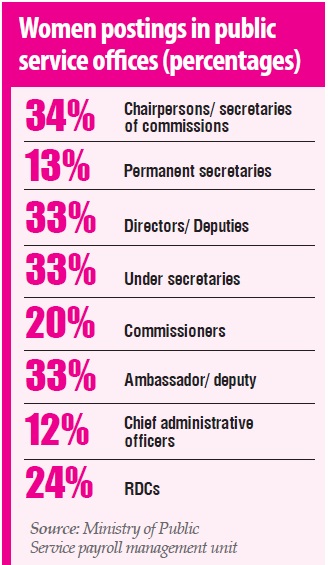
Blame it on patriarchy
Dr. Consolata Kabonesa argues, however, that women have not yet earned the respect they deserve and do not have the financial muscle the men have yet politics has been highly monetized.
And Rita Aciro, the Executive Director Uganda Women’s Network (UWONET) says that women should not be blamed for campaigning on ‘being women’.
“Patriarchy has taught them this. It’s widely believed that men are superior to women. It takes generations to dismantle this,” Aciro says. According to her, when women cry out that they are being treated in a certain way, they are actually responding to defeat patriarchy.
“This doesn’t imply that they actually need favours or they are incompetent,” she said.
Aciro says patriarchy – a system of society or government in which men hold the power and women are largely excluded from it – does not onlyapply to parliament but at all levels including the judiciary, academia, and even cabinet where there are only nine female ministers,13 female state ministers, and six permanent secretaries in ministries.
So how come women have emerged without the benefit of affirmative action to successfully heads of state bodies and authorities? Many of these women are seen to perform well to the extent of outshining men and even fix what men have messed.
Kampala City Council Authority (KCCA)Executive Director, Jennifer Musisi, has been praised for changing the face of Kampala in just five years. KCCA under Musisi has cleaned up the city and grown revenue collection from Shs28 billion in financial year 2010/2011 to Shs75 billion in 2014/2015.
At the Uganda Revenue Authority, Doris Akol, is the Commissioner General. She succeeded another woman, Allen Kagina, who did great work at URA. Kagina is now executive director of the Uganda National Roads Authority (UNRA).
In police, Assistant Inspector General of Police (AIGP) Grace Akullo heads the tough criminal Investigations and Intelligence Directorate (CIID) which handles major criminal cases and Justice Irene Mulyagonja, the Inspector General of Government (IGG) for handling high profile corruption cases.At the National Social Security Fund (NSSF), Geraldine Ssali is the Deputy Managing Director. Although she is involved in a turf fight with the Managing Director, Richard Byarugaba, Ssali has not said she is being targeted because she is a woman. Is gender affirmative action, therefore, only for women in politics like Kadaga?
Not so says Kabonesa. According to her, it is unfair for political leaders to be compared to leaders in other statutory bodies because in these bodies, these women are bosses and major decision makers who are only accountable to one individual or a small group of people.
“Politicians are never in charge. They are in that job because they were voted by people and they are therefore accountable to different groups of people,” says Kabonesa.
She says though Uganda has made a step in empowering woman to involve themselves in democratic processes such as contesting in an election and voting, there is still a long to changing long-held societal behavior and attitudes to women.
“Women are there but it’s only a few that can actually articulate issues. While we need the numbers, we also want to retain those that can articulate issues ,” Kabonesa argues.
Despite such strong support for affirmative action, Matembe said women MPs should be limited on the number of times they can stand on the affirmative action slot. She says this will enable the big shots such as Kadaga and others like FDC’s strong woman Cecilia Ogwal of Dokolo district to move on and, possibly, unseat men.
 The Independent Uganda: You get the Truth we Pay the Price
The Independent Uganda: You get the Truth we Pay the Price



